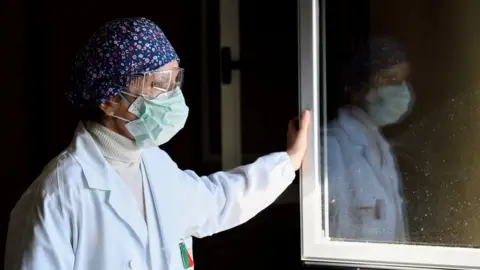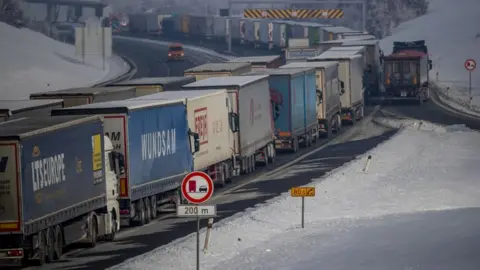Coronavirus: What Europeans have learned from a year of pandemic
 Reuters
ReutersFrom the first case diagnosed a year ago at a hospital in northern Italy to the empty shops, restaurants and stadiums of Europe's cities, the lives of Europeans have been changed forever.
Curbs on movement have forced every country and society to adapt its rules and rethink its culture. There have been hard truths and unexpected innovations in a year that changed Europe.

Restrictions are tough for societies used to freedom
 Getty Images
Getty ImagesSpain's lockdown was among the harshest in Europe, says Nekane Balluerka Lasa, professor of behavioural sciences methodology at the University of the Basque Country. Isolation was particularly hard for older people and lower-income families, especially if there was no nuclear unit. Spaniards are used to social interaction. Infections came down, but the economic cost was very high and the main lesson was the impact on people's mental health. Maybe that explains why it wasn't possible to keep it going. Our study found that 46% of people felt grave psychological distress.
Italians were initially frightened into uncharacteristic obedience, says BBC Rome correspondent Mark Lowen. They were the first to be crushed by the virus, the first to see intensive care units close to collapse, and friends and family dying. Very widespread respect for restrictions began to change with the second wave, with some protests against renewed lockdowns, given the fear and fatigue.
The Dutch didn't have a lockdown until December, but when a curfew was imposed in January, riots broke out, says BBC Hague correspondent Anna Holligan. Tensions had been festering. The unrest exposed an undercurrent of resentment across generations and came after a childcare allowance scandal had brought down the government. Most accepted the lockdown, but those already frustrated felt emboldened after the government had broken its own rules.
Germany's initial strategy was to test widely and then track and interrupt chains of infection, says BBC Berlin correspondent Jenny Hill. It worked until cases spiralled last autumn. The vast majority of Germans support lockdown measures, surveys suggest. But there has been furious resistance from some, who have protested, usually without masks or social distancing. Some are simply concerned by the impact of lockdown restrictions, but the protests tend to bring together conspiracy theorists, anti-vaxxers and far-right activists.
Slovenia has endured some of the tightest restrictions in Europe, and yet it has one of the world's highest death rates, says BBC Balkans correspondent Guy Delauney. Internal travel was banned from October until mid-February, most shops were shut and schools went online. Epidemiologists are baffled, but people here suspect that private socialising continued despite the emergency measures.
Sweden avoided a lockdown and built its strategy largely around voluntary social distancing guidelines, says BBC reporter Maddy Savage in Stockholm. The public largely complied at the start but, as cases spiked during the second wave, compliance got slacker. Tighter guidelines came in on alcohol sales and customers in bars and restaurants. But it wasn't until the turn of the year that a new pandemic law gave ministers greater powers to limit numbers in shops and on long-distance trains and buses.

Experts are essential, but mistakes have been made
 BIONTECH SE/EPA
BIONTECH SE/EPAThe pandemic inspired a new-found, national respect for German scientists, says the BBC's Jenny Hill. Virologist Christian Drosten is now a household name, as is Lothar Wieler, who runs the Robert Koch Institute that advises the German government. So are the married BioNTech founders Uğur Şahin and Özlem Türeci, who developed the first approved vaccine. Chancellor Angela Merkel, who studied quantum chemistry herself, is heavily influenced by the opinion of Germany's scientific community which, in the main, urges restrictions and caution. But the response to the pandemic has increasingly been characterised by squabbles among regional leaders, some of whom demand fewer restrictions on daily life.
Sweden's state epidemiologist Anders Tegnell has largely been the public face of the country's response to the pandemic, says Maddy Savage in Stockholm. Previously a low-profile bureaucrat, he quickly became a well-known and polarising figure both at home and abroad. Early on in the pandemic polls suggested 75% of the population backed the public health response. But that dropped to 50% as cases rose and tougher restrictions came in. His face appeared on T-shirts, while critics sent his family death threats.
Internationally, scientific advisers were called in but no-one thought to ask the experts on old age, says Ingmar Skoog, head of the Centre of Ageing and Health in Sweden. Half of all deaths in Sweden's first wave were in care institutions and another quarter had home care. It's very difficult to stop the virus coming into care homes as most people need a lot of help, but we didn't have enough protective gear. Most often it's not relatives who bring the virus into care homes; for six months we had a no-visit rule. So you had an 83-year-old man not allowed to visit his wife of 60 years. It's been suggested that may have been illegal.
Italy has picked experts for key jobs in the new government, says Mark Lowen in Rome. Initially ex-Prime Minister Giuseppe Conte had very high approval ratings, but old political divisions surfaced over how to manage the second lockdown and rebuild the economy. He fell and now technocrat Mario Draghi, ex-head of the European Central Bank, is in charge with experts running finance and education and a new ministry for ecological transition. There's a feeling opportunities to transform Italy had to be given to figures transcending political divisions.
While Serbia has had spectacular success with its vaccination programme, neighbouring Bosnia has suffered, says Guy Delauney. Bosnia has no strong, centralised leadership and tackling coronavirus has largely fallen to the two semi-autonomous regions, which have not covered themselves in glory. The prime minister of the Federation entity, Fadil Novalic, is due to stand trial over the award of a contract to procure ventilators to a fruit-processing company. And Bosnian health workers are more likely to get vaccinated in Serbia, where border centres have offered them a jab.

The EU wasn't set up for a pan-European health crisis
 AFP
AFPThe European Union was not well prepared, although it's far from unique in that, says BBC Europe correspondent Kevin Connolly. It did what it could to co-ordinate action - by creating "green lanes" at closed or crowded borders, to facilitate the flow of medical supplies. But it couldn't do much about the way individual states competed for PPE. Rich countries like France did much better than poorer ones like Bulgaria.
There was local co-operation when health systems were overwhelmed: patients were moved over the French border to hospitals in Germany; and recently Portugal received help from Germany and Austria. But it's perfectly possible such aid could have happened if the EU had not existed. The European Commission's really important attempt to ensure its own centrality in European life has been to take over the vaccine procurement programme from EU member states. This is a field in which it has no experience and it has not, so far, done well. A failure on vaccine procurement and rollout would create a major political problem.



Societies have responded in different ways
Hungary's birthrate has fallen, says BBC Budapest correspondent Nick Thorpe. Three thousand more babies were born in 2020 than in 2019, largely because of the conservative Fidesz government's generous tax incentives to couples to have more babies. But birth numbers began to fall in November and then fell further in December and January - the first months when a Covid impact could be registered. Government supporters draw comfort from the fact that the marriage rate continues to rise and abortion rates have plunged.
Spanish women have had it tougher, says Prof Nekane Balluerka Lasa. Several studies have shown that in families where both men and women work outside the home, women spend much more time caring for dependent elderly people and for their children. This may explain why the psychological discomfort of women during the pandemic was greater than that of men.
Ageism in Sweden has increased, says Prof Ingmar Skoog. There are 1.5m people in Sweden over 70 and the authorities went out and said they couldn't take care of themselves. But older people are completely different from 30 or 40 years ago: we talk about 70 as the new 50. Those who did not have carers only accounted for 10% of deaths.
Italy's long-entrenched brain drain has partially reversed, says Mark Lowen. More than five million Italians live abroad, up by more than 75% in the past 15 years, with the largest rises among high school and university graduates. While successive governments have tried to tempt them back, it's the pandemic that seems to have had a bigger impact in persuading Italians to return, to be with their families. The challenge now will be to keep them here.

A Europe without borders is fine in theory
 EPA
EPAKevin Connolly, Brussels: The concept of open borders is deeply ingrained in the theology of the European Union: the idea that a journey from Paris to Gdansk should be little different from a trip to Grenoble. But open borders don't work during pandemics. There was alarm in Brussels when some member states closed borders at the start of the pandemic, and then again when Germany imposed border controls with the Czech Republic and part of Austria this month. But business and leisure travel have fallen so much that the issue has not mattered so much.
Bethany Bell, BBC Vienna correspondent: One of the most notorious Covid outbreaks began last year at the Austrian ski resort of Ischgl, spreading to dozens of countries when foreign tourists went home. This year the ski slopes are open, but with quarantines, and hotels and restaurants closed, skiing is effectively only meant for locals. Police have fined dozens of foreign skiers who dodged the rules.
Imogen Foulkes, BBC Bern correspondent: Switzerland's alpine communities are also heavily dependent on winter tourism and the government has taken the controversial decision to keep the ski slopes open. Après ski parties are a distant memory, with restaurants and bars closed and lifts at reduced capacity. Economic damage is immense, but initial data suggests Switzerland's strategy may not be as risky as some critics claimed. Increased testing at resorts meant that outbreaks in Wengen and St Moritz were found and contained quickly.
Maddy Savage, Stockholm: Swedish ski resorts are open too, but skiers have been asked to stay one ski-pole apart and avoid socialising outside their group. So the après ski scene is toned-down, with no alcohol sales after 20:00 and no live bands belting out Abba or Avicii songs. But travel here for non-Swedes has become harder, with negative tests required for the first time this month,.
Guy Delauney, Ljubljana: Slovenians own more than 100,000 properties in neighbouring Croatia, so the offer of a €200 (£170) voucher last summer had little effect on domestic tourism. With no "firebreak" between the end of the summer holidays and the start of term, the suspicion is that students may have acted as vectors for transmission ahead of October's lockdown.

Hard truths about how we slaughter animals
 Reuters
ReutersMillions of mink were culled in Denmark when Covid-19 spread to mink farms. Carl Valentin, animal welfare spokesman for the Socialist People's Party: We have learned a lot about what diseases like Covid have to do with our relationship with animals. Everyone was talking about Wuhan and wet markets, but many Danes didn't know we had the world's biggest mink population. It's now been made illegal to farm mink this year and we'll never have a mink industry in that way again in Denmark.
Outbreaks among hundreds of workers at German meat processing plants, such as at Tönnies in Gütersloh last June, shocked Germans and led to a change in the law, says Jenny Hill. Scientists thought the workers were more vulnerable because of cool temperatures in slaughterhouses and loud machinery that forced them to shout. But there were stories of long hours, minimum wages and overcrowded accommodation for workers, mainly from Eastern Europe and employed by sub-contractors. From April, meat-processing plants will be largely banned from employing temporary workers.

Europeans embraced lifestyle change in different ways
 Getty Images
Getty ImagesFrance finally goes digital, by Lucy Williamson, BBC Paris correspondent. Until the second lockdown last autumn, life in France often evoked an age of typewriters and triplicate. Despite an annual turnover of almost €2.4tn (£2.1tn; $2.9tn), two-thirds of small businesses didn't operate online, and the websites of even vast iconic department stores like Galeries Lafayette or BHV offered little more than an address and opening hours, plus an image or two of some fancy shoes. Now, everything from cafe meals to tax payments and residency card applications can be made online and the department stores have slick websites. Boosting the digital economy has been a key goal for President Emmanuel Macron; the pandemic a strange ally in pushing France online.
Spaniards are working from home, for now, by Prof Nekane Balluerka Lasa. Spain is a very friendly culture: we don't know any other way. While digital transformation to "teleworking" here has been quite big, I think it'll complement face-to-face work and won't replace it completely. University students already spend one week at home and one week at university - and they want to come every day.
A cashless society? Not just yet, by Bethany Bell, BBC News Vienna: Since the pandemic began, it's become common to see signs in Austrian supermarkets asking for cashless payments to "protect" staff and customers. Austrians have traditionally liked paying in cash, but a survey by the Austrian National Bank last summer suggests the pandemic may have speeded up an already existing trend towards cashless payments, as with the rest of Europe. But cash is still very popular here. It's not unusual to come across cash-only cafes or shops, and there is little sign of it going out of fashion.

